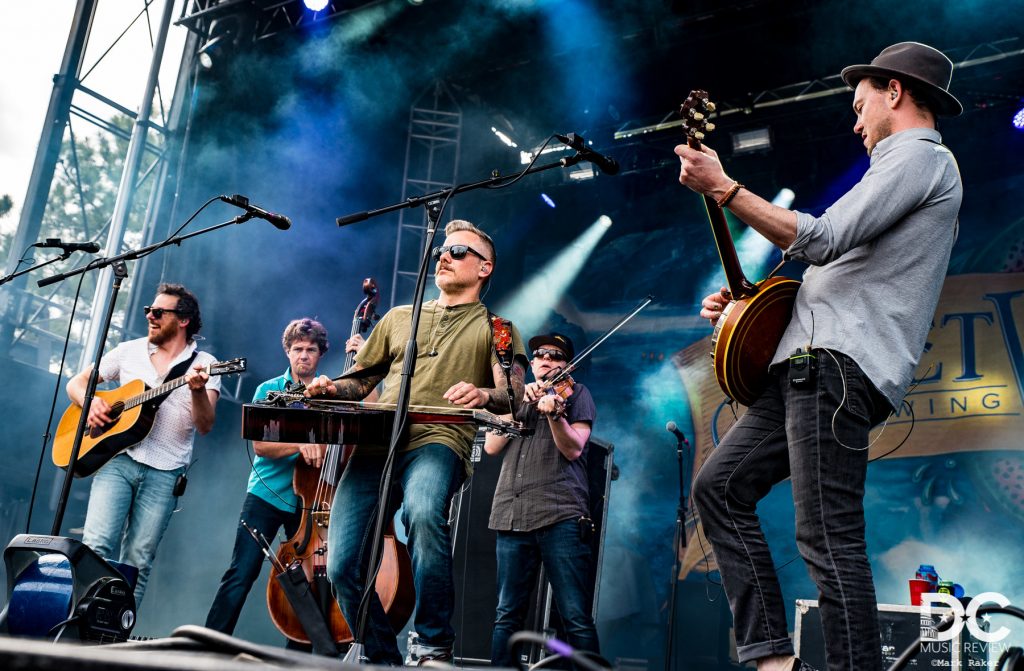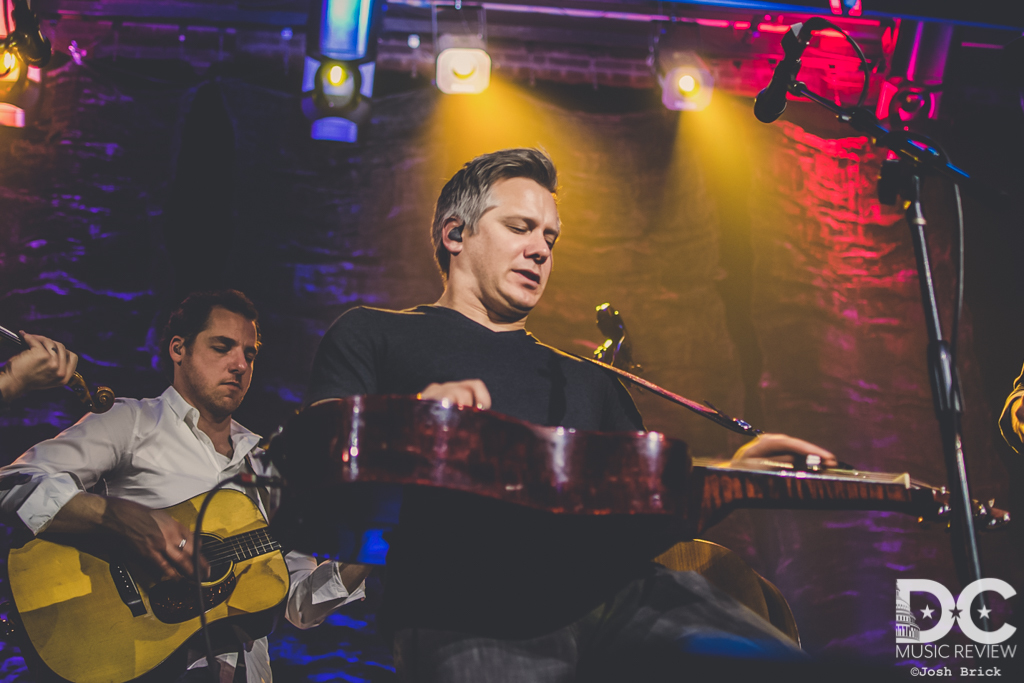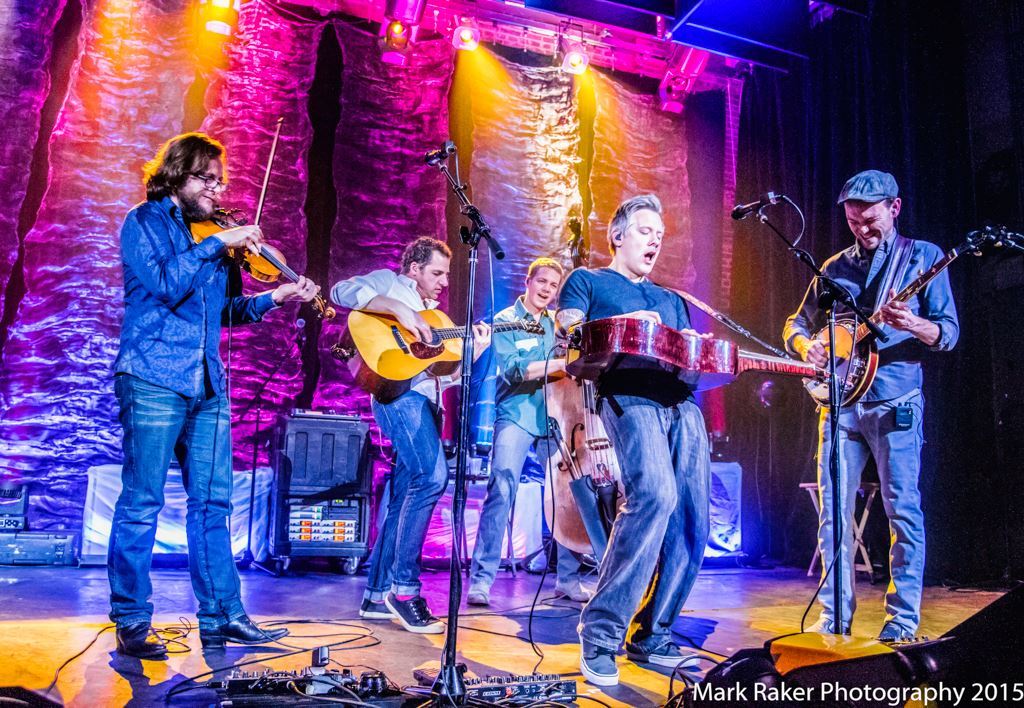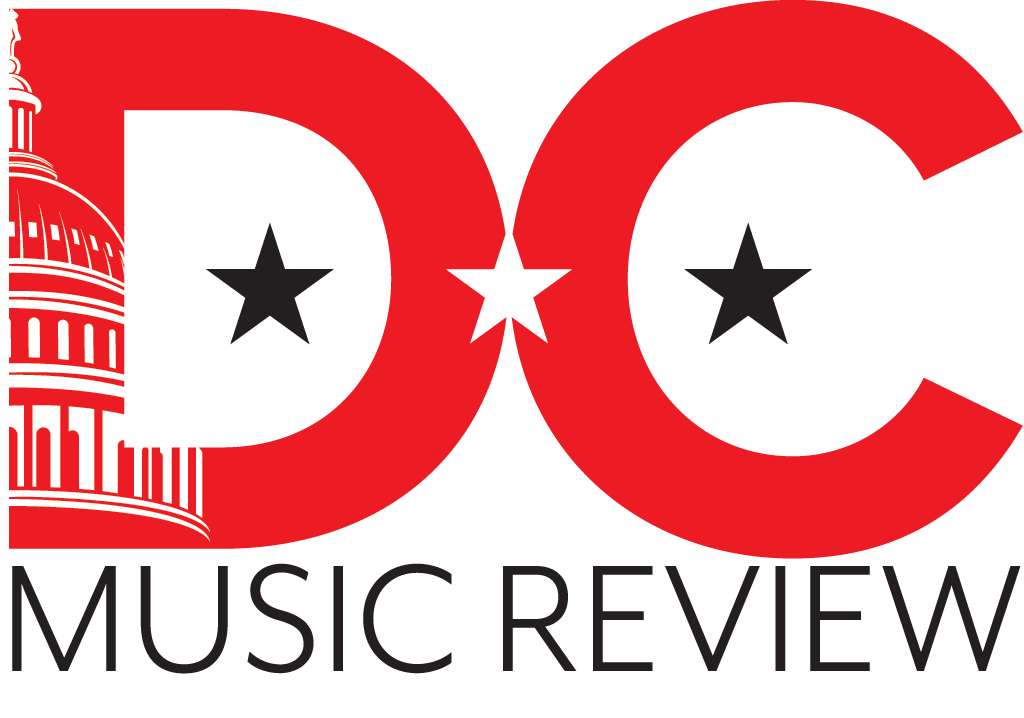Last time DCMR got to talk with The Infamous Stringdusters was after their set in Atlanta at Sweetwater 420 Fest and as the band makes their way back towards the Nations Capital, they prepare for the release of their newest work, Rise Sun. We wanted to hear all about what went into making this album from the Grammy winning band and what else, besides said Grammy win, has influenced their style, recording process and music in general. DCMR interviewer Karin McLaughlin got to talk with guitar player Andy Falco about all that and much more (as always). Catch up on the last interview here
Karin McLaughlin: You guys have really been checking off everything on the list. I mean, you got a Grammy, launched your own label, you've got a great band that I love on the label, Horseshoes and Hand Grenades and now, come Friday, have the release of another album. I don't even really know where to start on this one, but let's go over the process and the differences between just the albums from Laws of Gravity to the new album, Rise Sun.
Andy Falco: Well, you know, a lot of the process is something that's developed over many albums actually and constantly gets refined as you make more records and you have more experience. Also, as artists and musicians and songwriters we evolve, so the process changes gradually over the course of many records. Pretty much any record that we do, we go into the studio and we play the songs live and then when we get a take that we like and, depending on what's appropriate for the song, we go back and include just little extra little bits where you're kind of using the studio as an instrument in itself.
Typically, we have an idea for 15 songs with a priority list and we might record some extras and then you end up just picking what you think fits the best after the fact. This time, we picked the 13 songs that were going to go on to the record and not only that, but we had sequenced the albums so we knew what order they were going to be in on the record once the record came out. We decided that we wanted to also incorporate something that happens on our live shows which is these transitions in between songs that are improvised and it creates these kind of jams in between. So, in several places, because we knew the order, we were able to figure out where these jams could live on the record and where they would make sense. We recorded the entire album in order over the course of of eight or nine days, which was surprisingly incredible because you felt like you were living inside of the record for those days, almost like living the record in real time. As a result, it really helped shape the energy of the album and it flows in a way that the listeners are riding on the same energy that we had as a band.
For example, the first track "Rise Sun" is very energetic and sprightly like the first day in the studio and then if you go to the last track, which is "Truth and Love", all these little subtle sonic elements that appear throughout the rest of the record on different songs reappear in that last finale track. We were able to make these kinds of creative decisions because we recorded the album in order and everything was informed by what you had done the day before and what you were going to be doing tomorrow. We were able to make creative decisions based on how the record was going to flow as a whole. That was the main thing that we incorporated that was new for us and we feel like it worked out really well.


KM: Have there been any significant changes since starting your own label as far as the recording process? Are there things that you noticed that you've done differently based on the experiences now, having that notch on on your belt?
AF: Just having our own label, I mean, we've been with several labels before, including Compass, which we did a couple of records with and before that we were with Sugar Hill. There's always pros and cons to working with a label as an artist, and we've had decent experiences with the labels thankfully. Really what it does is it just allows us to sort of operate and keep our hands on everything in-house basically. Also, as far as our own records go, we can do things on our own timeline and be able to really oversee everything and do it just as we want. The bigger picture of Tape Time and having the label is to create a space where bands who are in this interesting corner of the music world, this jam grass kind of scene, have a community. We wanted a place where we could also release records for people who are in the same boat as us and trying to just get the music out to people and build a community. The community from the live standpoint in our corner of the genre is very, very strong, so we wanted a place where that community also existed in a recording format and in a label format.


KM: I think that it's very much admired and appreciated. I talked to Adam (Greuel of Horseshoes and Hand Grenades) and he couldn't say enough good things about not only you guys as friends and fellow musicians and almost mentors, but also the fact that they had the opportunity to work with you guys on your own label and how much they appreciate that there are musicians making music for musicians. There's nothing lost in that.
AF: Right. I mean it if that's kinda how it was years ago, right?
KM: Yeah I feel like to a certain extent, you're not dealing with as much maybe of the marketing and all that kind of stuff. You're in there to make the music and make it sound good. I mean, obviously, making money and selling the records is the bonus, but it's all about the actual music as the musicians understand it. I think that's kind of the underlying appreciation that he was expressing, which is pretty damn cool if you ask me.
AF: Well it needs to be, I mean, especially I feel like in this day and age. Now marketing and all that stuff, it's important, you know, and we would be naive to think that it isn't. We have to keep fuel in the bus to be able to get to the shows, (laughs) but nowadays it has gotten increasingly more difficult for professional musicians like ourselves and other bands to be able to make a living off of recorded music in the age of Spotify and whatever streaming service you want to use, right? There's a lot of benefits to that I think and there's a lot of great things about it, but unfortunately, one of the downsides of it is it makes it more difficult to monetize recorded music.
"It's really about trying to create art and make music that we want to make, that is genuinely us. It comes right from the heart and you hope that you can touch somebody with it."
I think we're kind of in a no man's land when it comes to that as a music industry. It's not that music has ended, the business of music is still strong, it's just changing. It is one of these things where we have to go out to make a living. We have to go out and play shows, which we love to do fortunately (laughs) but the recorded records, it's become very difficult to actually make money. It has to be about the music, because what else they're going to be about? It has to be about creating, and having a moment.
For us making a record as a band, that's the moment when we get into a house and, for days at a time together, we show each other songs and we work on the music and we really get creative with the arrangements and the writing. That's when all of the crucial parts of the creative process happens for us. Then you get into the studio and you're creating more. It's kind of like when they're making pottery and using the clay wheel. That's when we're getting our hands dirty in the music, you know what I mean? We're really diving in as a band. Then you release your baby out to the world and, you know, you hope people enjoy it. It's really about trying to create art and make music that we want to make, that is genuinely us. It comes right from the heart and you hope that you can touch somebody with it.
KM: So I've been getting my Timehop reminders and it seems that you guys like to come to the D.C area around the beginning of April apparently. Over the past week I'll get a memory from like three years ago, and then oh, two years ago, that I was at a Stringdusters show (laughs). So we're super excited that this time it coincides with your actual album release day. Now that we've talked about the hard work and how it's done, let's talk about if there's anything special you guys are going to be doing to commemorate the occasion on Friday.
AF: Yeah, we have some surprises up our sleeve and we're going to be celebrating the day. Ultimately, I think it'll come down to the music in the show. I think we're still trying to figure out exactly what things to do and what little surprises and how to celebrate exactly, but it's a joyous day for us. It takes a long time, the whole process of making a record. I mean, we were in the studio a year ago making the record really. We leaked out a few of the singles and even this week, we're going to start playing them all live. We usually wait for the album to come out but we've been playing the singles as they've been coming out. Just last night we actually put one other new song into the rotation, but once the record comes out, that's when everything on the album comes into the live repertoire and we're really excited.


It's really amazing when you have that chance to debut one of your new songs live. It's kind of like when you're a cook, and you get to serve your new dish and you actually get to watch somebody evaluating it and hopefully enjoying it (laughs). That's a really interesting moment. You're biting your nails a little bit and you play it and wonder what the reaction might be. It's kind of a cool thing to have that moment. So come Friday, that's when everything will be available to potentially be on a set list. All of our shows are different, you know, every night is a different set list so we're not going to play all the songs on Friday night I wouldn't think, but some of them will definitely be there and they'll definitely be some new material.
We love playing in D.C, we've been going there for many years and we just love it so we're really excited that that's where we'll be able to celebrate the new release.
KM: You guys are a very strong improv band. You can, it seems like, just throw anything out there and it works. How is that? It's grown and changed and morphed over the years for sure. You can't really practice improv so how do you build on that and continues to make us, as an audience, think, "Wow, how the hell did they just do that?"
AF: By listening to each other very closely and understanding that the sum of all the parts is great. Having everybody - that's when there are some of the most interesting jams. Everything's sort of intertwined musically and there's a conversation happening, underlying on some sort of bed of soundscape. The sky's the limit on variations of that. It's like having any conversation with people that you are really close with. Like having a conversation with your best friend and getting coffee, there's no end to the conversations you could have. That's kind of how it is with those improvs, it's improvised what we call the type two sort of jams. We don't really know what's going to happen and it's the full band, as opposed to like other types of jams, where there's one dedicated soloist, right? That's kind of different. That's more of a solo that can build and it is a jam, but it's a different thing than the group, where everybody is incorporated and throwing out little phrases and then being answered and everything is kind of a reaction to what's going on.
I think those are really something that we consciously started to kind of develop in the last few years because we started to realize that that was growing into something that was interesting to us and so we just kept exploring it and we continue to.
KM: We've also seen a lot of collaborations from you guys. I remember back at Lockn and you guys did set with Lesh right?


AF: Yeah, that was really a highlight collaboration.
KM: I've also seen you on stage at Delfest with Del or the Travelin McCourys maybe?
AF: Yeah absolutely. Before they had Cody (Kilby) full time I used to go do tours with the Traveling McCourys and I played with them many, many times which is amazing for me because when I was learning how to play rhythm guitar I used to watch the Del McCoury Band and watch Del and what he was doing. Over the years they've become really dear friends so obviously getting the opportunity to then be in that slot and be in that position playing with them was an honor and it was just so much fun. Now they have Cody who is, to me, one of the greatest flat pickers in the world without a doubt. We love those guys so much and they won the Grammy this year, we were so happy for them.
KM: Yeah they are really stand up guys. I've gotten to interview Rob and Ronnie (McCoury) and they are just so nice. Ok, so I just also kind of want to touch on a couple other things. I really dig y'alls artwork for your covers. The Laws of Gravity artwork was incredible and the almost geometric watercolors you guys have in the Rise Sun background are beautiful. How much are you guys involved in and is there an idea of who's going to do your artwork for your covers?
AF: We had the same person do Ladies and Gentlemen and Laws of Gravity, because this guy Scott does these really cool, actually miniature sets that he photographs, and then does art with them as well, it's a really interesting concept. Often times, we get some ideas from our team or general ideas from the band, but it all starts with throwing stuff against the wall and seeing what sticks and then ideas start to emerge. Our team gets us some options and some good artists and we choose somebody and then we're off and running and that's kind of how it goes. We all get to see the stuff and we get to give our comments and then it gets refined and then at the end everybody's pretty happy with it, you know?
KM: The band has been out on tour and you've got quite a bit of dates lined up already for summer. You're back here in D.C. and then, we talked about Phil Lesh, I saw you guys get to do Red Rocks with him and Terrapin Station, that's going to be amazing!
AF: Oh, yeah, that's going to be so much fun. We love Phil, obviously a huge influence, but also has become a friend, a good friend of ours over the years. It's just amazing to actually get to have gotten to know him after so many years of the musical influence that he's had on all of us. He's incredible. To this day, he's still so inspiring. Giving it 110% every show and it's really an inspiration, so we look up to him a lot.
KM: Also a bunch of festivals. I see 4848, Peach Fest, you guys are going to be at Northwest String Summit and Blue Ox. Is there a, if not a favorite festival, a favorite festival memory?
AF: I mean, there's so many but I would say that Lockn set with Phil and Friends and the Stringdusters. Derek and Susan (Tedeschi) were up there for a bit, Anders Osborne, I mean, that was that was pretty special set. I went to my first (Grateful) Dead show in 1986 and saw them many times with Jerry, of course so, you know, we all were pretty stoked up there. Anders is a hero of mine back to my blues days and I loved his records and still do. And of course, Derek and Susan. So having the opportunity to do that set was just really a magical thing and that's all I can say about that.
KM: The version of Sugaree that came out of that set is pure bliss and I listen to it over and over again! So, wrapping up, let's just maybe talk about the last single that came out "Truth and Love". It has, when I listened to it, almost, in the very beginning, like a trippy, space, time travel type vibe to it. Is there anything to that? Or is that just me?
AF: (laughs) Well, you'll have to hear the record. There is something to that and when the record comes out you'll see more of what I mean.
This interview has been edited and condensed for clarity.
The Infamous Stringdusters
Performance Details
Performance
Details
Friday, April 5th
Doors: 7:00 PM
Show: 8:00 PM
$25
Related Articles
Related Articles
Related Articles
